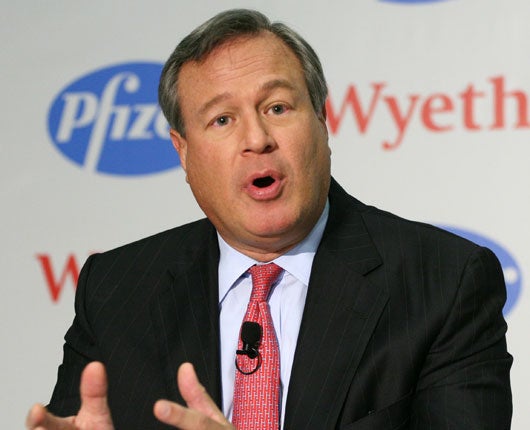Pfizer chief executive in shock retirement from 'demanding' job

The chief executive of Pfizer stepped down unexpectedly yesterday, blaming exhaustion from the "extremely demanding" job and relishing the opportunity to "recharge" his batteries.
Jeffrey Kindler, who has led the world's biggest drug company since 2006, will be replaced by 32-year Pfizer veteran Ian Read, who is currently the head of biopharmaceutical operations. A replacement for Mr Kindler's role as non-executive chairman will be found within two weeks.
Mr Kindler was with Pfizer for nearly nine years in total, before which he did stints at General Electric and McDonald's. He described his tenure in the pharmaceutical giant's top job as "extremely exciting and rewarding" yesterday, expressing pride in "some transformational accomplishments". But the strain was excessive, he said.
"The combination of meeting the requirements of our many stakeholders around the world and the 24-7 nature of my responsibilities, has made this period extremely demanding on me personally," Mr Kindler said. "I am excited at the opportunity to recharge my batteries, spend some rare time with my family, and prepare for the next challenge in my career."
The handover to Mr Read comes a year after Pfizer bought rival Wyeth for $68bn (£43bn), a move designed to give the group a foothold in vaccines and biologics and help insulate it against the loss of its blockbuster cholesterol drug, Lipitor, which moves out of patent protection in the US next year, with the addition of the Enbrel arthritis drug and the Prevnar pneumonia vaccine.
It follows a tricky patch for the group, which has seen its shares drop by more than 30 per cent under Mr Kindler's stewardship, largely over investor concerns about Lipitor, which racked up sales of $11.4bn last year. Within months, the new chief executive was forced to give up on a putative Lipitor successor, torcetrapib, costing the company nearly $1bn. He subsequently cut the group's headcount by more than 14,000 in an attempt to reduce costs.
Then, in 2009, Pfizer agreed to pay $2.3bn over allegations it had illegally promoted four drugs for uses not approved by regulators. The fine was the biggest healthcare fraud settlement in US history. Although this year has seen Pfizer gain approval for a vaccine, there have also been several setbacks, including problems with the blood thinner Apixaban and Alzheimer's treatment Dimebon.
Mr Kindle's efforts to reinvent the company in the face of expiring patents and changes in the global industry drew praise from the Pfizer board's lead independent director, Constance Horner, yesterday. "Due to the efforts of Jeff, the executive leadership team and Pfizer's talented employees around the world, the company is now a stronger, more diversified and more focused company," she said.
Subscribe to Independent Premium to bookmark this article
Want to bookmark your favourite articles and stories to read or reference later? Start your Independent Premium subscription today.

Join our commenting forum
Join thought-provoking conversations, follow other Independent readers and see their replies